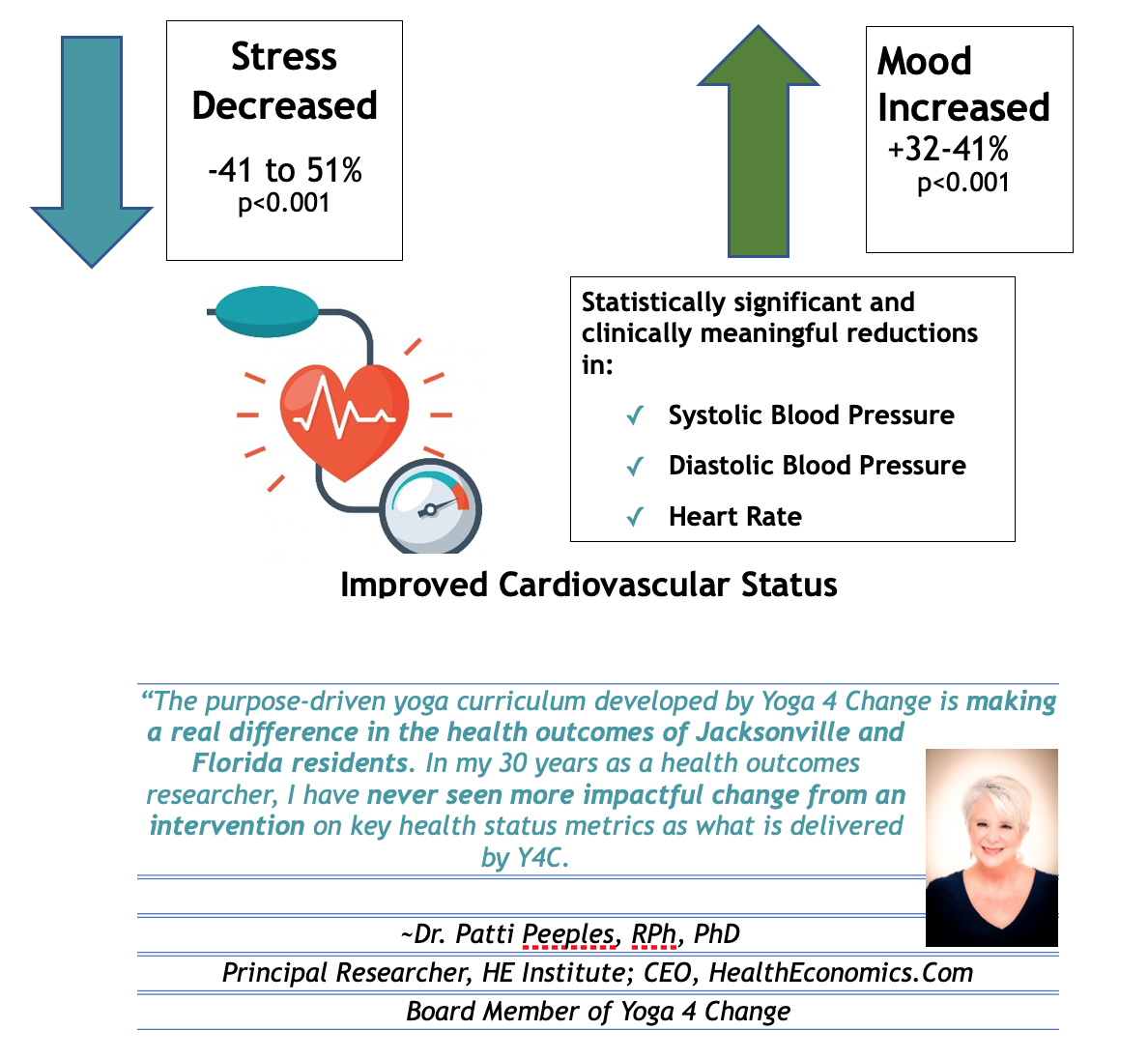Data, Impact, and Change: “Why” I am a Board Member for Yoga 4 Change
Data, Impact, and Change: My “Why” as a Board Member for Yoga 4 Change
Patti Peeples, RPh, PhD, Principal Researcher, HE Institute, CEO, HealthEconomics.Com
We are all drawn to volunteer service for different reasons: to help others, find purpose, or connect with community. If you volunteer, you probably have your own motivation. I’d like to share with you a story about the “why” behind my service as a Board Member of Yoga 4 Change through which I witnessed some of the most impactful change in health outcomes in my three-decade career as a health outcomes researcher.
Three years ago, I met the founder, Kathryn Thomas, of Yoga 4 Change (Y4C) at a women’s business owner mentoring group. Kathryn is one of those people who change the tenor of a room (for the better) when she enters. Kathryn had a deep belief in the mission of Y4C, using purpose-driven yoga to heal and empower underserved populations to create healthier, safer communities. But Kathryn also had a “won’t stop” attitude that I found infectious. So infectious, I stopped her in the hallway and volunteered to help.
What was I thinking? I am not a yoga practitioner. But, as a healthcare researcher, I was interested in how Yoga 4 Change was creating healthier, safer communities. To be honest, I was a little skeptical that yoga could deliver meaningful change to Y4C’s target populations including incarcerated individuals, those dealing with substance abuse, veterans, and vulnerable youth. But, if anyone could do it, I figured Kathryn was the one.
Where’s the Data?
Fortunately, I was invited to join the Board of Directors, and my first question to Kathryn and her staff was, “where’s the data?”. Now, most non-profit organizations a mere 2 years in existence at the time (Y4C is 5 years old now) would not have any idea of the need to collect outcomes or how to go about it. But Kathryn and Y4C are different. From day 1, Yoga 4 Change has been collecting measures of impact on students, including changes in stress, mood, and for some populations, blood pressure and heart rate. I was astonished. Moreover, the Florida Data Science for Social Good, spearheaded by faculty from University of North Florida, had selected Yoga 4 Change as one of three non-profits to address a “wicked problem facing Jacksonville residents” and they only choose organizations that are considered data-rich that have the potential for substantial social impact. To a researcher, words like “data rich” and “major university professors doing the data analysis” are really exciting and within my first week as a Board member, I attended this presentation on the impact of Yoga 4 Change on cardiovascular outcomes, mood, and stress.
Meaningful Change
The results were extremely impressive.1 Among 1,636 high-risk individuals who took one or more Y4C classes, stress was statistically significantly reduced 41-51% (p<0.001) and mood improved 32-41% (p <0.001). Statistically significant (p < 0.001), clinically meaningful reductions in systolic and diastolic blood pressure and heart rate occurred. Among the 29 individuals with Stage 2 hypertension pre-yoga, 100% improved to Stage 1 (better cardiovascular status) post-yoga!
“The purpose-driven yoga curriculum developed by Yoga 4 Change is making a real difference in the health outcomes of Jacksonville and Florida residents. In my 30 years as a health outcomes researcher, I have never seen more impactful change from an intervention on key health status metrics as what is delivered by Y4C. ~Dr. Patti Peeples, RPh, PhD, Principal Researcher, HE Institute; CEO, HealthEconomics.Com, Board Member of Yoga 4 Change
What We’ve Learned
So, what have we learned in the past three years about the impact of Yoga 4 Change?
We know that:
Mental health outcomes can be improved, resulting in significantly lower stress and improved mood. In high-risk populations such as incarcerated, those dealing with substance abuse, at-risk youth, and veterans, this is particularly important because anger, violence, recidivism, and low self-esteem are potential consequences that can be avoided or reduced by this trauma-informed yoga. We have a safer community and Y4C classes may facilitate rehabilitative programs by promoting emotional regulation and behavior management.
More Yoga 4 Change classes per individual delivers even better outcomes. Our research shows that individuals who had 10 or more yoga sessions had a 34.5% greater reduction in stress compared with those with a single session; mood results were similar. (2) We need to fund more classes per individual.
Cardiovascular health is improved – statistically and clinically significantly – by Yoga 4 Change, and this can potentially address a community- and nation-wide public health concern. Our data show that after just one class, individuals with high-risk hypertension were moved to normal blood pressure readings immediately post-class.
For every $1 invested in trauma-informed yoga such as Yoga 4 Change, there is a potential savings of $10.60 due to avoided cardiovascular consequences like myocardial infarction and stroke.2 So, for every $100 donated to Yoga 4 Change, we return $1,060 to the community in savings just on cardiovascular metrics!
More research is being done. Yoga 4 Change has partnered with Florida Blue, The Chartrand Foundation, and Boston University, among others, to continue their assessment of the impact of Yoga 4 Change. Additional health status outcomes are being studied and control groups are included. Yoga 4 Change is an organization with a deep commitment to change, guided by informed research.
Why Not?
My “why” for volunteering for Yoga 4 Change has turned into so much more than I anticipated. I’ve developed a deep and abiding respect for this organization and its mission. I commit my time, talent, and treasure to an organization delivering meaningful change to underserved populations right here in Jacksonville. Instead of asking why, I now ask “Why not”. Why not you? Join us to volunteer or make a donation.
References
Richard D, Umapathy K, Pandya H, Rousis G, Peeples P. Real-world benefits of trauma-informed yoga on cardiovascular and mental health outcomes in four high risk populations: an observational study. Int J Yoga Therapy (submitted; in review).
Data on File, Yoga 4 Change.

